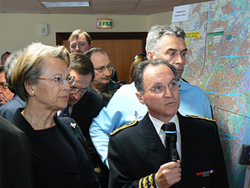French government gives ground to NATO protestors
Strasbourg is bracing itself for a battle between protestors and a hi-tech army of police and soldiers. The movements and meetings of the 27 heads of state are the targets, while the people are caught in the middle.
The first visit of a senior French minister to the site of the 60th NATO Anniversary Summit coincided with some concessions by the authorities. As the clampdown on Europe’s human rights capital got under way, French Interior Minister Michèle Alliot-Marie was in town to boost the morale of worried security forces. Speaking to journalists in the police command post, backed by a range of screens linked to 400 closed circuit television cameras, she admitted that up to 60,000 demonstrators are expected to come from all over Europe. She said the security measures were the most extensive ever undertaken in France and were intended to deal with the threat of terrorism and the risk that an estimated minority of 2,000 demonstrators might cause damage to people and property.

However, in the face of credible threats by protestors to block the roads for the convoys of the 28 heads of state, the banquet to have been held in Strasbourg on April 4 has been cancelled. The anti-NATO village previously contested by the authorities has quietly been accepted. Protestors also seem to have won the right to demonstrate within the boundaries of the City of Strasbourg as well as on the symbolic Bridge of Europe. Apologies have been issued for the ban on anti-NATO flags.
The massive security forces now installed in Strasbourg, Kehl and Baden-Baden, just across the Rhine, had their first taste of trouble when 2,500 protestors paraded without authorization through the centre of nearby German city of Freiburg at the weekend. They were escorted by twice that number of police. There have already been scuffles between police and demonstrators in the anti-NATO village just outside the town involving tear gas and stun grenades. The visiting minister was briefed about the latest precautions by generals from the army, air force and the gendarmerie as well as top officials. For the first time she revealed the number of extra police in the city at 9,000 – although other sources claim that throughout the Alsace region the number is much higher. A squadron of fighter aircraft will be kept on standby in the air by refueling aircraft, and every modern technological device will be used to see what is happening on the ground.
Effects on the locals
Meanwhile, ordinary people are experiencing the consequences of hosting the Summit with its accompanying clampdown, estimated to have cost French taxpayers over 100 million euro. Walkers in the
forests of northern Alsace were surprised to see squadrons of helicopters flying in from American bases in Germany. On Tuesday traffic was already being delayed by controls at the Franco-German frontier outside Wissembourg, 70 kilometers from Strasbourg, despite promises that this would not be the case.
Sightseers and residents in Strasbourg were told that they were forbidden to take photographs of the military installations springing up in the city. Shopkeepers and the tourist trade have been hit hardest by the restrictions and residents have also expressed their frustration. Movement other than by foot or bicycle will be almost impossible for two days. Nevertheless, many citizens are proud that their city is in the limelight. Retired policeman Jacques Martin said “We should not forget that NATO helped to keep the peace during the Cold War. We certainly do not want riots in the city centre”.
‘Le Tribunal Administratif’ – the court that hears disputes with the government – has received six urgent complaints about the restrictions. The Human Rights League (LDH) has complained to the court about the creation of an illegal computer database containing details of 40,000 citizens. Their lawyer told the judge that “the authorities have lied to the public” by claiming that the register that contains names, dates of birth and professions had previously been cleared with the National Council for information and liberty as required by law. Police claimed the database was to help ease traffic flow.
Robert Harneis for RT
Source: http://www.russiatoday.com/Politics/2009-04-01/French_government_gives_ground_to_NATO_protestors_.html?fullstory



